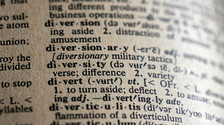azahrah.qolbaina
what the things that make verb 2 and verb 3 different
I was confised by verb 2 and verb 3. Can you explain it?
16 de mar de 2012 11:16
Respostas · 3
What is verb 1?
16 de março de 2012
It sounds like you're asking about patterns like "see - saw - seen", or (Brad's example) "go - went - gone".
Basically, the past participle ("verb 3") always needs a helping verb. Always. It can't function without one. So you can say "I have seen" or "it is gone", but "it gone" and "I seen" are completely wrong; you need "it went" and "I saw" (simple past) in these cases.
You use the past participle in perfect tenses (I have seen; I had eaten; I will have spoken), hypothetical forms using "have" (I should have known; it could have sunk), or passive forms (it is known; that was eaten).
Verb 2 (past simple) is the basic past tense of the verb.
16 de março de 2012
Are you talking about the simple past (e.g., "went") vs. the past participle (e.g., "gone")?
16 de março de 2012
Ainda não encontrou suas respostas?
Escreva suas perguntas e deixe os falantes nativos ajudá-lo!
azahrah.qolbaina
Habilidades linguísticas
Árabe, Inglês, Indonésio, Turco
Idioma de aprendizado
Árabe, Inglês, Turco
Artigos que Você Pode Gostar Também

Top 6 Mistakes to Avoid with Vocabulary Acquisition
38 votados positivos · 10 Comentários

Navigating Your First Job: Do's and Don'ts in the Workplace
47 votados positivos · 21 Comentários

What Content to Watch to Acquire Advanced-level Proficiency
79 votados positivos · 50 Comentários
Mais artigos
